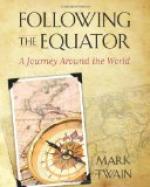January 5. At 9 this morning we passed Cape Leeuwin (lioness) and ceased from our long due-west course along the southern shore of Australia. Turning this extreme southwestern corner, we now take a long straight slant nearly N. W., without a break, for Ceylon. As we speed northward it will grow hotter very fast—but it isn’t chilly, now. . . . The vulture is from the public menagerie at Adelaide—a great and interesting collection. It was there that we saw the baby tiger solemnly spreading its mouth and trying to roar like its majestic mother. It swaggered, scowling, back and forth on its short legs just as it had seen her do on her long ones, and now and then snarling viciously, exposing its teeth, with a threatening lift of its upper lip and bristling moustache; and when it thought it was impressing the visitors, it would spread its mouth wide and do that screechy cry which it meant for a roar, but which did not deceive. It took itself quite seriously, and was lovably comical. And there was a hyena—an ugly creature; as ugly as the tiger-kitty was pretty. It repeatedly arched its back and delivered itself of such a human cry; a startling resemblance; a cry which was just that of a grown person badly hurt. In the dark one would assuredly go to its assistance—and be disappointed . . . . Many friends of Australasian Federation on board. They feel sure that the good day is not far off, now. But there seems to be a party that would go further —have Australasia cut loose from the British Empire and set up housekeeping on her own hook. It seems an unwise idea. They point to the United States, but it seems to me that the cases lack a good deal of being alike. Australasia governs herself wholly—there is no interference; and her commerce and manufactures are not oppressed in any way. If our case had been the same we should not have gone out when we did.
January 13. Unspeakably hot. The equator is arriving again. We are within eight degrees of it. Ceylon present. Dear me, it is beautiful! And most sumptuously tropical, as to character of foliage and opulence of it. “What though the spicy breezes blow soft o’er Ceylon’s isle”—an eloquent line, an incomparable line; it says little, but conveys whole libraries of sentiment, and Oriental charm and mystery, and tropic deliciousness—a line that quivers and tingles with a thousand unexpressed and inexpressible things, things that haunt one and find no articulate voice . . . . Colombo, the capital. An Oriental town, most manifestly; and fascinating.
In this palatial ship the passengers dress for dinner. The ladies’ toilettes make a fine display of color, and this is in keeping with the elegance of the vessel’s furnishings and the flooding brilliancies of the electric light. On the stormy Atlantic one never sees a man in evening dress, except at the rarest intervals; and then there is only one, not two; and he shows up but once on the voyage—the




